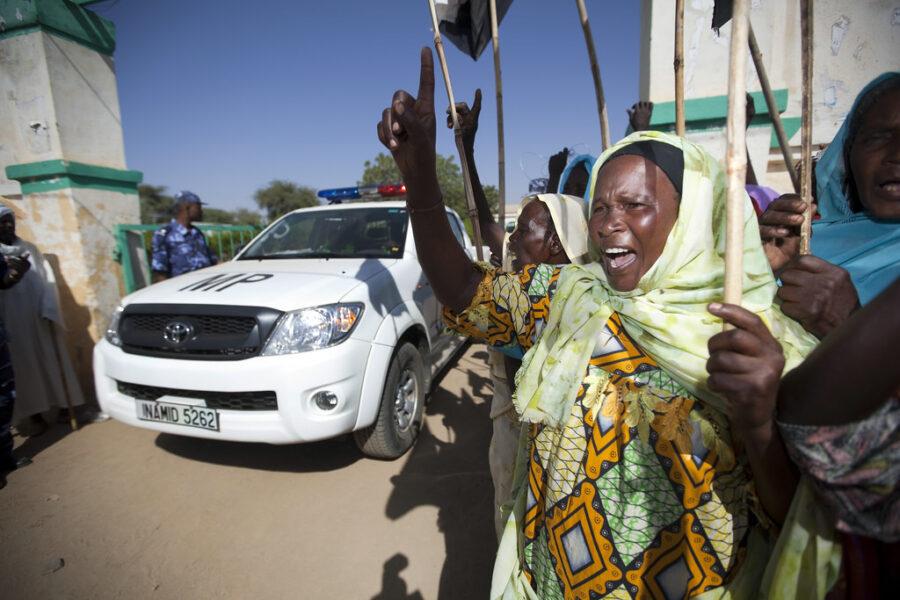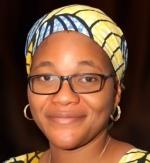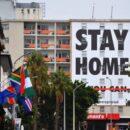Simplifying peacemaking in a complex world

Three former heads of state of Nigeria, South Africa, and Ethiopia reflect on what it takes to end conflict in a meaningful way.

Demonstrations in Darfur during mediation efforts in 2010. Credit: UN Photo/Albert Gonzalez Farran.
In the wake of the Cold War, the disintegration of an ideologically bipolar world provided an opportunity for peace agreements across the globe. This was even the case in seemingly intractable conflicts like Nicaragua, El Salvador, Namibia, and South Africa.
From that era, three key ingredients for successful peacemaking and mediation stand out.
First, the solution had to be political. The conflicting sides had to believe that there was more to be gained from negotiating than continuing to fight.
Second, there needed to be leadership that was practical and visionary at the same time. In South Africa, for instance, Nelson Mandela and FW de Klerk both realised that they could not do it alone and that they needed unity within their ranks as well as a common bond between them to bring about another country. They trusted their chief negotiators, Roelf Meyer and (now president) Cyril Ramaphosa, to keep communications open even when tensions were high. The two parties shared the outlook of focusing on the future more than fighting about the past. De Klerk is said to have remarked at the time: “We are going to liquidate this country”.
Third, there needed to be a recognition that you can’t fix conflicts without international and regional support. The outside world had to keep pushing parties to the negotiating table and not let them off the hook. The isolation of South Africa, for instance, played a critical part in changing the mind of the ruling National Party in the late-1980s, as did the end of Soviet bloc support for the African National Congress (ANC).
Since the early-2000s, this brave new world has descended into a more complex and dangerous one in which a range of actors, old and new, complicate efforts to achieve peace. This complexity has been compounded by the inadequacy of multilateral systems, with the UN being shown to not only be ineffective but to have fundamentally flawed institutional structures. Added to this are widening inequalities, the weakness of state institutions, and the spreading tentacles of transnational criminal interests.
This poses immense risks, especially in Africa, where the majority of the world’s poor live. The continent faces a perfect storm of rapidly changing demography, weak development and growth, climate change, widening deficits of democracy and leadership, a diversion of donor interests, and growing debt. International attention is also diminishing, especially with Western partners lacking credibility and turning inwards to confront domestic problems.
There are other challenges too. The multiplicity of state and non-state actors offering their peace services can not only lead to “forum shopping” by participants in peace processes but provide excuses to continue fighting. Today, peacemaking involves less of a “brilliant soloist” mediator than an “accomplished conductor” managing a team or a set of mediation teams.
However, some things remain the same.
For one, local agency is crucial, though external actors have an important role to play in maintaining pressure.
Leadership is also essential to set an example. Properly applied leadership can shape collective views, as Israel’s Menachim Begin and Egypt’s Anwar Sadat did over the Sinai in the 1970s. This requires acceptance of the view, however, that nations can be born around the negotiation table, not only in blood.
Vision is still needed too, as is the seizing – and sometimes manufacture – of windows of opportunity. Patience in working out a solution is perhaps the most powerful attribute of all. The setting of arbitrary timelines should be discouraged as drivers of a peace process.
Some mediation techniques remain relevant, including the need to strengthen political opponents to convince their constituencies, something at which Nelson Mandela was, according to FW de Klerk, especially astute. Similarly, confidentiality encourages risk taking at the negotiating table. And it is crucial to work out the details of a solution before a peace agreement is signed.
The constitutional framing of the solution to conflict is necessary too, but constitutions are not self-executing documents. They require building institutional capacity which can take decades, while building adherence to governance systems can take even longer.
It is vital that leadership does not just come from above. Listening to, and supporting local communities and civil society, is essential in embedding a culture of peace and civic participation. Institutions – both public and private – are an essential part of successful societies. Media, civil society and the private sector, along with government, have to support them.
Crucially, politics and values matter. Those favouring peace should give support to each other. This means that Africans should be interested in what happens in Ukraine, for example, just as Africans would like wider international support in resolving their challenges.
Democrats also need to band together just as authoritarians continuously lend each other support. This includes support for political prisoners and their families, legal counsel, financing, media, the building of internal capacity, and an anti-kleptocracy agenda.
Given the changes to the complexity of the operating environment for peacemakers, some thinking has to take place out of the box. Supporting peace may require novel means of relieving debt of post-authoritarian or post-conflict countries – debt swaps with China for example. There may also be a need to appoint external agencies; without this, the prospects for positive engagement in a situation such as Ethiopia – with a multiplicity of actors from the AU, US, EU, Russia, Turkey, UAE, Qatar, Saudi Arabia among others – remains fragmented and diluted at best.
And, crucially in this all, for peace to stick and for there to be metrics of success longer than just a constitution or election; there needs to be ongoing and inclusive discussion. Economic growth is a critical means of ensuring community inclusion, stability, and security. The role of leadership must go beyond liberation to more mundane tasks of state-building from sewerage to education.
Italian nationalist leader Giuseppe Garibaldi neatly summed up the challenge of contemporary peacemaking and nation-building when he said: “Having made Italy, now we have to make Italians”.






